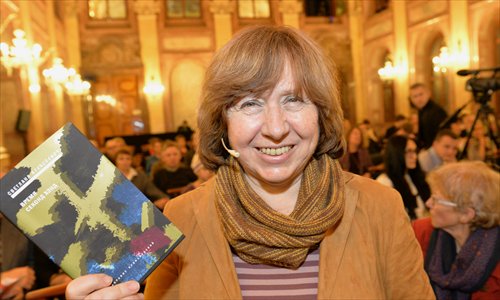HOME >> ARTS
Chronicler of tears
By AFP - Global Times Source:AFP-Global Times Published: 2015-10-8 21:38:01
Svetlana Alexievich wins Nobel prize for literature

Svetlana Alexievich attends the Prague Writers' Festival in Prague, Czech Republic, on November 7, 2014. Photo: IC
Belarussian author Svetlana Alexievich, who won the Nobel prize for literature on Thursday, has drawn international acclaim with her emotional accounts of the Chernobyl disaster and World War II based on witness accounts.
Chronicling such horrors in the first person through the words of witnesses, Alexievich has seen her works translated into numerous languages and scooped international awards.
But her books, controversially written in Russian, are not published in her home country, long ruled by authoritarian president Alexander Lukashenko, amid what the author has described as "a creeping censorship."
Alexievich, 67, began tape-recording accounts of female soldiers who took part in World War II while she was working as a local newspaper reporter in the 1970s.
The resulting book, War's Unwomanly Face, was long barred from publication because it focused on personal tragedies and did not emphasise the role of the Communist Party. It was finally published in 1985 under the perestroika reforms.
Alexievich later used the same technique of first-person testimonies to document the despair of mothers who lost their sons in the Soviet invasion of Afghanistan - in Zinky Boys.
'Ear to the ground'
"I need to catch a person at a moment when they have been shaken up," Alexievich told Russia's Ogonyok weekly magazine.
"It's very important to listen when someone is speaking up. I always keep my ear to the ground."
In 1998, she published Voices From Chernobyl, a collection of horrifying accounts from people who had worked on the nuclear clean-up of the 1986 disaster. The fall-out affected Belarus more than any other country.
Her most recent book Second-Hand Time - a non-fiction work examining the legacy of the Soviet mentality over 20 years after the collapse of Communism - was awarded France's prestigious Prix Medicis essai in 2013.
Since Lukashenko came to power in 1994, Alexievich's books have not been published in Belarus and she has lived most of her life on writers' scholarships in Italy, Germany, France and Sweden.
Alexievich has openly criticized Lukashenko's tight control of Belarus under a Soviet-style economic system and the country's continued use of the death penalty.
"We see who is leading us - this is the time of a triumph of mediocrity," she said in a 2013 interview with the newspaper Belorusskaya Delovaya Gazeta.
Angering the elite
She has also weighed into the debate over the crisis in Ukraine by praising protestors who ousted Kremlin-backed leader Viktor Yanukovych in February 2014 for trying to shatter the links with the country's Soviet history.
"Ukraine is an example for all. The desire to break completely with the past is worthy of respect," she said in an interview.
The author has though angered the literary and intellectual elite in Belarus by writing in Russian, not in the Belarussian language, amid a strong drive to revive national culture and language.
"Alexievich isn't interested in the problem of Belarussian identity. So I can see why Svetlana with her 'Russian-ness' interests Russians, Japanese, Germans and Swedes, but not Belarussians," Belarussian novelist Natalka Babina told AFP.
In an interview with Germany's Frankfurter Allgemeine Zeitung daily, Alexievich was quoted as saying: "I write only in Russian and see myself as a part of Russian culture. The Belarussian language is very rural and immature as literature."
Alexievich later said that she had been misquoted in the interview, which came out after she won the Peace Prize of the German Book Trade in 2013.
The outspoken writer has also condemned the growing domination of socially conservative and Orthodox Christian beliefs in Russia.
"This wailing about a 'great national idea' or a desire to make Russia an Orthodox Iran... is a path going backwards," she told Ogonyok.
Svetlana Alexievich in China
Several of Svetlana Aleksijevitj's books were published in China a long time ago. According to Qiu Huadong, deputy editor-in-chief of People's Literature magazine, War's Unwomanly Face was first introduced to China in the 1980s, while Zinky Boys and Voices from Chernobyl were also published in the country and were even republished in recent years.
In Qiu's opinion, political considerations had a lot of weight in the decision to give the Nobel to Alexievich.
"They wanted to select an author who has persistently criticized social realities in Russia and Alexievich is no doubt the best choice," Qiu told the Global Times, adding that the Ukraine crisis has led to a taut relationship between Europe and Russia.
"Personally speaking, that's the main reason they chose her."
Despite this, Qiu said that Alexievich's achievements in literature should not be underestimated. The second non-fiction writer to win the Nobel literature prize since Churchill in 1953, Alexievich has established a unique oral style in her work.
"I regard the award a win for non-fiction writing. It is sure to push forward the development of non-fiction in China, urging people to reacquaint themselves with this genre. That's the most meaningful result of this prize to me," Qiu said, explaining that in recent years non-fiction has been on the rise in China.
However, Qiu is not optimistic about Alexievich's chances of rising to popularity considering the subject of her books.
"Like previous years, her works will see a rise in publication, but they won't exert much influence on readers in China."
AFP - Global Times
Posted in: Books